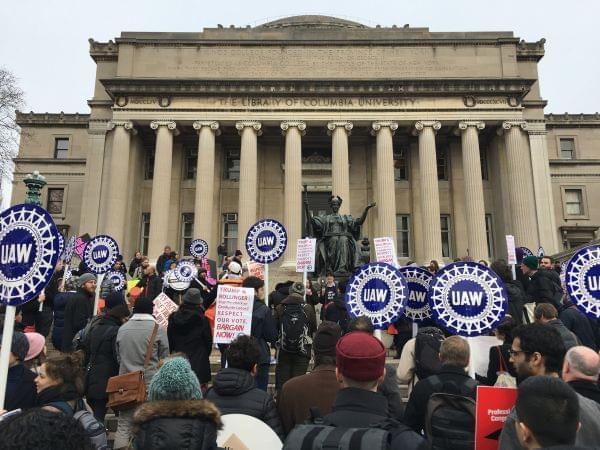Graduate Students At Columbia Try To Bargain As A Union

In this Feb. 1, 2018 photo, demonstrators advocate for a union at Columbia University in New York after the school announced earlier in the week that it won't bargain with the students who voted overwhelmingly for union representation more than a year ago. Union advocates say other universities are similarly declining to bargain or to agree to union elections, perhaps waiting for a more management-friendly NLRB to reverse its earlier ruling. Nate Wagner/AP
A year after graduate students at Columbia University formed a union, the administration refuses to bargain with them. Julie Kushner of the United Auto Workers talks with NPR's Scott Simon.
SCOTT SIMON, HOST:
Graduate students who teach at Columbia University are gearing up for a fight to unionize. They voted to unionize more than a year ago. But the university says it will not bargain with them. Julie Kushner is director of the United Auto Workers branch that represents the Columbia Graduate Student Union. She joins us from the studios of WMPR in Hartford, Conn. Thanks so much for being with us.
JULIE KUSHNER: Thank you for having me.
SIMON: What do your members want?
KUSHNER: Well, they want the right to sit down and negotiate their terms and conditions of employment with the university. And just like any other workers, they have serious concerns about the way they're paid, how much they're paid, what their benefits are and how they resolve problems on the job. So these workers, you know, see an advantage to having the opportunity to sit down as equals at the bargaining table.
SIMON: It sounds like they want more money and more benefits?
KUSHNER: Well, certainly, those are key issues. But they're not the entire set of issues that they have, you know? There have been longstanding problems at the university in, you know, getting paid on time, getting ability to resolve a problem with your supervisor, dealing with issues of sexual harassment.
SIMON: The university refuses to bargain with the union. And let me quote the Provost John Coatsworth who says, "The relationship of graduate students to the faculty that instruct them must not be reduced to ordinary terms of employment." How would you respond to that?
KUSHNER: Well, I think that in every workplace, there are special conditions that govern the particulars of that industry. And clearly, university workers are very special in many ways. But that doesn't stop the fact that they're working. They're getting paid. They're getting benefits from their employer. And they have a right to organize just like any other workers in the United States. And by refusing to bargain, now this employer is breaking the law. And what's really infuriating is that a prominent university like Columbia can say that they are going to ignore the law and refuse to bargain.
SIMON: Columbia University is a famously liberal place. Are you surprised by this response?
KUSHNER: Unfortunately, I'm not surprised because when it comes down to labor relations, employers - even liberal employers - often look to gain ground by refusing to bargain with the union. And I think it really hurts Colombia's image and their reputation when they pursue this course of action like any other boss. You know, they begin to look like employers like Walmart.
SIMON: Sounds like you're suggesting they're liberal and progressive except when it comes to their pocketbook.
KUSHNER: Absolutely. I think that is part of the problem. And, you know, what's disturbing is that in public universities all across the United States, there are collective bargaining rights for graduate employees. And there are strong contracts. And even at NYU right down the street, UAW has established a contract, worked through problems with the employer - with the university. So I think what's really unfortunate is that Columbia is becoming an outlier.
SIMON: How did the United Auto Workers wind up representing Columbia teaching assistants?
KUSHNER: We have actually been a part of this graduate worker movement since the late 1990s not just in the eastern part of the country but all over the country. And we are a very diversified union. We have represented workers in all kinds of industries - not just in the auto industry. And in particular at Columbia, we represent the support staff and have since 1985. You know, I personally was involved in their organizing and in negotiating those contracts. And so we have a very long relationship at Columbia. It wasn't surprising that when teaching and research assistants look to a union, they look to the UAW.
SIMON: Julie Kushner of the United Auto Workers, thanks so much for being with us.
KUSHNER: Thank you so much for having me.
SIMON: We asked Columbia University for a comment, and we're waiting for a response.
(SOUNDBITE OF UNKNOWN MORTAL ORCHESTRA'S "FROM THE SUN")

